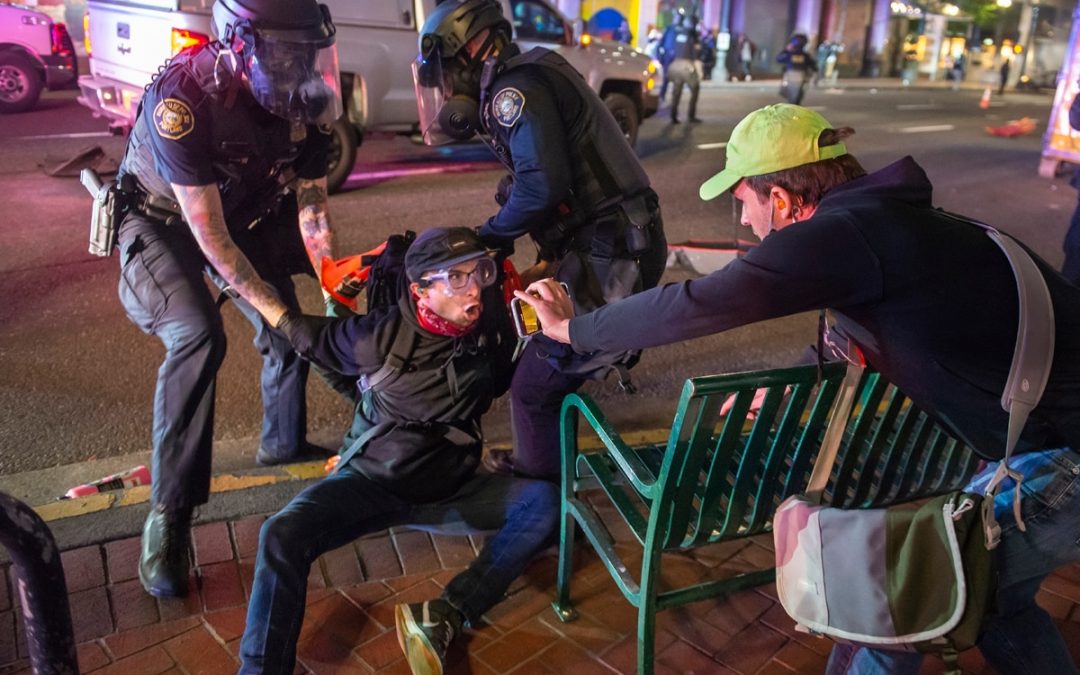Photo Source: Nathan Howard in the Willamette Week
A newscaster reported today (August 7, 2020) that “The mayor of Portland, Oregon, a city wracked by nearly 70 consecutive nights of unrest, on Thursday angrily denounced those who attempted to set a police precinct on fire with officers stationed inside as props in President Donald Trump’s reelection campaign and said those individuals were not protesters, but criminals (emphasis added).”
Virtuous protestors? Or evil criminals?
In my lifetime, I have never seen so much divisiveness around me: black/white, democrat/republican, protesters/police. It seems we are increasingly carving up the world into the good guys versus the bad guys.
In general, there is some level of agreement among social psychologists, ethicists and religious leaders: It’s good to be kind, fair and just; it’s bad to cheat, murder and steal.
But good versus bad has fueled horrendous conflicts throughout history, and we don’t seem to be learning the lessons history has tried to teach us. The binary labels continue to fuel impassioned destruction today. I use the terms ‘fuel’ and ‘impassioned’ very intentionally. If I believe I’m on the side of ‘good,’ I will be certain that I’m fighting a just cause against an ‘evil’ enemy; and I will believe without a doubt that once the ‘evil’ people have been brought to their knees, peace and goodness will reign.
We’re treading on dangerous ground here.
My guest on this week’s podcast is Arno Michaelis. At a very young age, Arno became deeply involved in the white power movement. He was a founding member of what became the largest racist skinhead organization in the world. He was a reverend of a self-declared racial holy war and lead singer of the race metal band Centurion, selling over 20,000 CDs to racists around the world.
Is he a bad person?
Now, fast forward. Today, Arno is a public speaker, author of My Life After Hate, and works with Serve2Unite, an organization that engages young people of all backgrounds as peacemakers. Currently, Arno is devoting his life to making this a more just and peaceful world.
Is he a good person?
In Arno’s words:
“All human beings share an equal capacity to harm or to heal. If we convince ourselves otherwise, there’s no way to reconcile from that. If we convince ourselves that this group of people are just inherently more violent than my group or whatever — when we convince ourselves that everyone doesn’t share an equal capacity to harm or heal, then there’s nowhere to go from there but violence.”
This is not a theoretical debate.
As we can see all around us, the practical implications are enormous. The ongoing destruction and violence in Portland, Oregon is just one example. We are poisoning even potential acts of compassion with hateful divisiveness if we’re approaching the issue with categorizations of good versus bad.
I believe that human nature is infinitely more complex than either good or bad. We’re all a combination of those qualities. What matters is what we do with them. As Arno said, “My hard shell covered up the insecurity and fear I felt inside — I would say that fear is the basis for all the violence in the world.”
And yet our obsession with good versus bad continues. Did you know that according to a Marist Poll, “being a better person” was the most popular New Year’s resolution for 2018? (Well, OK, it shared the top spot with weight loss!)
I wonder what kind of world we could create if we stopped obsessing about who’s a good or bad person, and instead focused on ways to heal the fear that drives the violence both within and around us?


Arno says that fear is the basis for all the violence in the world. I agree 100% that fear leads to anger which leads to hatred which leads to violence. While we might like our religious and political leaders to make these problems go away, much of the responsibility for the desperately needed transition probably lies with each us finding our own inner peace so that we can be the foundation for the world we wish to live in.
Only people, who have not lived THIS in the former Sowjet Union (as told by my parents, and Mennonites being able to flee and celebrate with a day of thanksgiving for the “Errettung aus Russland” ever since to this day with a “Dankgottesdienst” on Nov. 25), will not question what they see and experience at this time. They might even be under the impression, that these developments can only bring about positive change for a better world for everyone. All I know is, if we stay complacent and don’t wake up, we will find ourselves in a world we no longer recognize, a nightmare we can’t wake up from. But by then it will be too late, if it’s not already.
Fear was at the root of that tragedy as well, wasn’t it? For me, the key question is how to live from a place of love rather than fear, beginning in my own life.